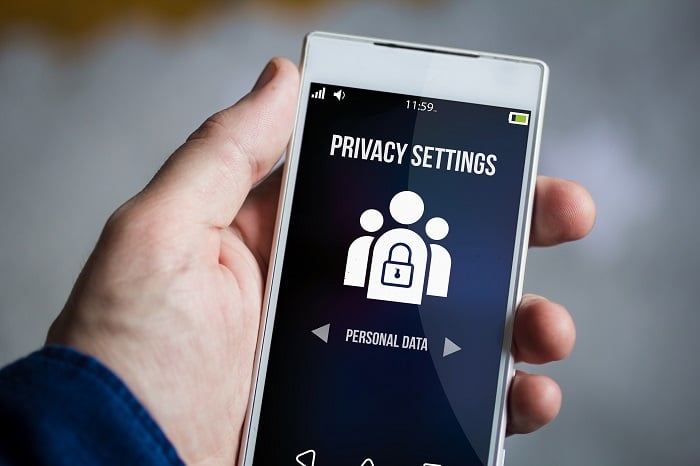You are viewing our site as an Agent, Switch Your View:
Agent | Broker Reset Filters to Default Back to List6 Essential Privacy Settings for Your Smartphone
April 21 2024
 How would you feel if you lost your smartphone? It feels like your entire life is on your smartphone. That's because it's more than just your everyday tech device: it's your computer in your pocket.
How would you feel if you lost your smartphone? It feels like your entire life is on your smartphone. That's because it's more than just your everyday tech device: it's your computer in your pocket.
You use it to communicate with clients, access your transactions, schedule appointments, navigate to showings, and generally manage your business on the go. But just like you lock up your physical office to secure sensitive client information, you must also lock down your digital data. After all, we don't leave a key under the mat for clients to access a home!
Safe and secure
Because smartphones these days are incredibly powerful mini-computers, that computing power comes with privacy risks, especially if you don't have the proper settings in place.
You would never want a client's personal information to fall into the wrong hands, but if you don't have the right privacy settings on your phone, you're taking that risk.
Fortunately, with a few fundamental privacy tweaks, you can secure your smartphone and protect your clients and business.
Here are 6 essential privacy settings that every real estate agent needs on their smartphone:
Screen lock: Securing your front door
Think of your smartphone as if it were your home. Just as you wouldn't leave your front door unlocked, securing your smartphone with a screen lock is critical. This feature is the first barrier against unauthorized access.
A strong PIN or password can be likened to a high-quality deadbolt — difficult for intruders to bypass. Biometrics, like fingerprints or facial recognition, offer convenience and an additional layer of security, acting as personalized, uncopiable keys to your digital home.
Pro tip: Regularly updating your screen lock settings ensures that your first line of defense remains impenetrable.
App permissions: Who has the keys?
Granting app permissions is akin to handing out keys to your home. It's essential to periodically audit these "keys" to ensure only the necessary apps can access your data.
For example, a mapping app may require your location to function effectively, like giving a gardener access to your backyard. However, a simple note-taking app requesting access to your contacts or location might raise red flags — why would the app need that to function? Regularly reviewing and revoking unnecessary permissions is like changing the locks after a key has been lost; it's a crucial step in maintaining your privacy.
Multifactor authentication: The alarm system
Two-factor or multifactor authentication (or MFA – read more about it here) acts as an advanced security system for your digital property. Even if a hacker manages to guess your password, using an additional verification step, such as a code sent to your phone or email, keeps them shut out.
Think of MFA as an alarm system that notifies you of an intruder's presence and stops them in their tracks, providing an additional layer of security. Implementing MFA, especially for email and social media, is akin to installing motion detectors and cameras around your home, offering you peace of mind that an extra layer of defense is in place.
Location services: The privacy fence
Your smartphone's location services can be incredibly beneficial but pose a privacy risk if not managed correctly. Think of location as your digital property's boundary. Just as you construct a fence for privacy, it's wise to control which apps can access your location and when. Adjusting these settings to "While Using the App" ensures that your location is shared only on a need-to-know basis, like opening your gate for guests during a visit and then securely closing it afterwards.
Public Wi-Fi: Leaving the door unlocked
Connecting to public Wi-Fi without protection is like holding an open house without leaving the front door open so anyone can enter, as it poses potential risks to your privacy and security.
A solution is to use a virtual private network (VPN). It encrypts your data, effectively creating a private viewing for your online activities. This ensures that your digital communications and activities remain confidential even in a public setting, safeguarding sensitive client information and your personal data from digital eavesdroppers.
Software updates: Home renovations
Regular software updates are the renovations and repairs of your smartphone. These updates patch security holes and enhance functionality, like fixing a sticky door or replacing a broken window: both can make a home more secure.
Neglecting software updates can leave your device vulnerable to new threats, like letting a property fall into disrepair, which can lead to more significant issues. Setting your device to update automatically ensures that your phone remains in top-performing condition, safeguarded against the latest security threats.
Protecting your – and your client's – privacy
Remember, remaining vigilant and proactive to protect sensitive information is the best way to keep your client's trust. Implementing these six essential privacy settings will fortify your smartphone against potential breaches, ensuring that your digital device remains a secure and private environment for conducting business. This protects you and solidifies your reputation as a diligent and conscientious agent in the eyes of your clients.
Finally, if you need help with any of these steps to make your phone more secure, just reach out to the Tech Helpline for support!
Related reading
- Top 5 Ways for Real Estate Agents to Protect Their Data and Personal Privacy
- 4 Ways to Improve Your Cybersecurity
- 6 Reasons Not to Use Similar Passwords and the Best Alternatives
To view the original article, visit the Tech Helpline blog.









